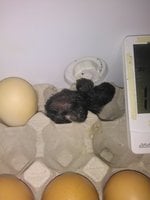ArkAvian
Chirping
- Nov 5, 2018
- 21
- 9
- 59
hatched a totally black chick. The mother a cross between a halfbreed Leghorn hen and Cornish cross roo. The father could be the brother from the same batch or it could be her own father OR a RIR looking roo I reverse bred from the red sex link chicks. I will upload more pics tomorrow. I need help in identifying really what I have combined from so many crosses. Only one black chick survived the rest died because the eggs were all double yolked. Also is that normal? The hen only lays a single yolk rarely all others are double yolked is this strange?






